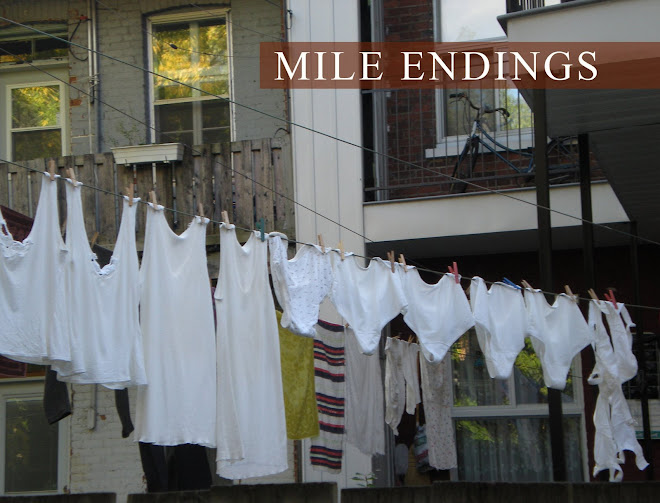At the sculpture garden near Clark and Van Horne, he stepped through a hole in the fence and walked to a grassy spot along the tracks, well away from any rail traffic. He put down his chair, undid the pack and pulled out a gleaming tuba.
"I'm a little bit tucked away here," he said. "I'm between the St. Urbain underpass and the train tracks. The odds of someone telling me to be quiet are very small. It's not that I get a lot of complaints at the house, but I like to give the neighbours a break."
The light bounced off the golden bell of his tuba as he played scales. A breeze buffeted the music, carrying the low resonant notes down the tracks and through the trees along the chain link fence.
An orchestral tuba player, Johnson, 39, first fell under the spell of the instrument's breadth and power when he was 12.
"There are many more musical possibilities with the tuba than people think. Most people just know about Oompah and Oktoberfest but it can also sound very tender." To demonstrate, he sent a heart-rending passage floating over the tracks. It was the scene of Juliet's death from Prokofiev's ballet of Romeo and Juliet.

A few years ago, Johnson took lessons with the tuba player from the New York Philharmonic who encouraged him to play outdoors as a way of preparing for auditions.
"The tuba is designed to be the foundation of an 80- to 100-piece orchestra," said Johnson. "Auditions are in concert halls. Playing in a tiny practice room is nowhere close to that. Outside is the largest place possible.
"Now I tell my students to play outside. In fact, I teach out here sometimes," added Johnson who is an instructor at Schulich School of Music at McGill and the Royal Conservatory of Music in Toronto. He also commutes to work in Toronto with his main employer, the National Ballet of Canada.
"I love playing outdoors and I love coming to the tracks, but it's no fun having to worry about getting a ticket," he said.
The Canadian Pacific police give $144 tickets to anyone they catch crossing the train tracks or setting foot in the green space along the railroad. People in Mile End, Little Italy and Rosemont are actively protesting the ticketing and lobbying for the establishment of a level crossing at the tracks at the spots where people want to cross the tracks, sometimes known as desire lines.
"I'm breaking the law just by being here," Johnson pointed out.
He stepped back through the hole in the fence to head home and a woman enjoying the sun on a bench in the sculpture garden said: "Thanks for the concert."






5 comments:
Sarah:
What a lovely piece. I'd never heard the phrase 'desire lines' before. I love that there is actually a name--and such a poetic one--for those! I always look for places where people have found the most direct route, but I never knew there was a special name.
All the best!
I've heard this guy, he's good.
He can speed through a minor scale with no obvious effort at all.
Nice piece. I stumbled on it while writing up an intro to a video that we filmed in and around the tracks: http://openalex.blogspot.com/2011/06/montreal-guerrilla-gardening-tour-de.html
Love this blog post about my sympathetic tuba-playing neighbour Sasha - thank you so much for adding another layer to the image I have of him ;)
Stumbled on this blog today by accident - would love to see it continue. Huge fan of oral history and of Mile End.
My kind of neighbourhood. And this is my kind of blog.
Adding this to Google Reader in the hopes of seeing new posts soon!
Cheers
Michelle
Thanks for this great piece! I live close to those tracks and hope to stumble upon him one day. It would be such a treat!
Post a Comment